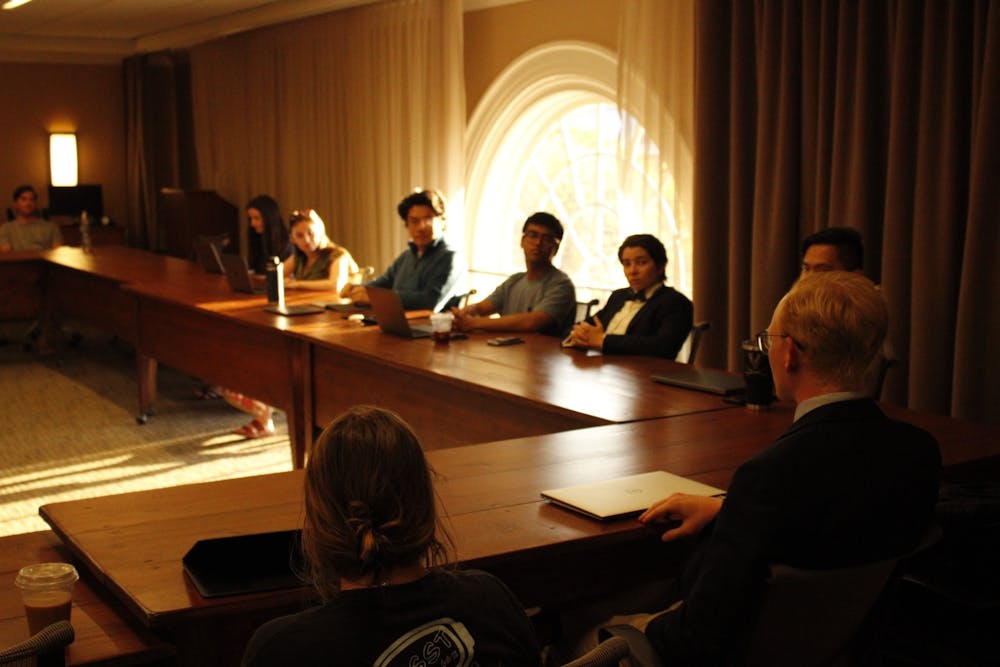The Honor Committee members used its third meeting of the semester to discuss the possibility of instituting a multi-sanction system and potential ways to increase community support for Honor processes. While only 12 out of 20 members were in attendance — one short of quorum after meeting quorum in the first two meetings of the term — those in attendance expressed unanimous verbal support for a multi-sanction system.
Gabrielle Bray, chair of the Honor Committee and third-year College student, began the discussion by sharing that she hopes to implement a multi-sanction system during this term and said she will use goals proposed by Committee members as a “roadmap” for the Committee to follow. A multi-sanction system allows punishments to be determined based on the seriousness of the violation rather than every guilty student receiving the same sanction, and could include sanctions ranging from a written apology or a warning to expulsion.
“We have talked for many years — there are files in my office dating back to the 60s and 70s talking about the values and hindrances of single sanction and the potential move to multi sanction — and I think we have finally reached the point where that needs to happen,” Bray said.
Before any final decisions are made, Bray said the Committee must facilitate a discussion about the potential benefits and risks of a multi-sanction system, and emphasized the importance of engaging the University community in such discussion as well as being transparent about potential changes to the Honor constitution before the student body elections next year.
In the fall, Honor representatives submitted constitutional proposals to the Committee for discussion. Four out of five such proposals called for a multi-sanction system, including one plan proposed by Bray which would have added a sanction that allowed students to take a leave of absence in addition to the sanction of expulsion. Ultimately, all five proposals failed to pass internally, but the Committee did express verbal support for a transition to a multi-sanction system.
In March, students voted four to one to reduce the single-sanction of expulsion to a two-semester leave of absence, the largest change in the Honor system’s history. The change did not, however, institute a multi-sanction system.
Rep. Kelly O’Meara, graduate Architecture student, said he supports a multi-sanction system and voiced his belief that the Committee should use the new term as an opportunity to work with all schools to better define Honor’s function at the University.
“So therefore, a big personal push for me as well is finding, what is, what is Architecture’s role in Honor? Why do we sit at this table? What is its role in other schools, and Why is Honor still relevant?
Following unanimous but unofficial verbal support for a multi-sanction system, Rep. Daniel Elliott, first-year Law student, advised that the community look to the University Judiciary Committee — which uses a multi-sanction system with punishments ranging from written warning to expulsion — for possible methods of implementation. This multi-sanction system has been in place since the earliest model of the UJC appeared at the University in 1948.
“There is wisdom to be gained from UJC in that they have had a multi-sanction system for a very long time and it seems to work,” Elliott said.
Bray echoed Elliott’s point and suggested members look to other peer institutions —including the University of North Carolina at Chapel Hill, which has a multi-sanction Honor system — for inspiration.
“A worthwhile exercise for all of us to engage in is to look at how other schools handle things and what we can learn from them,” Bray said.
Hamza Aziz, second-year College student and vice-chair for investigations, said he thinks it is important for the Committee to actively communicate with the community as multiple substantial changes at once may be hard to follow.
“I really hope the student body understands from today onwards the Honor Committee is working towards this [multi-sanction system] and it's not going to be a blunt change, but rather something that is thought out,” Aziz said.
In addition to discussing goals for the semester, Bray provided members with time to provide updates on behalf of the school they represent.
Reps. Jane Lyons and John Sun, third-year Commerce students, shared that they are working on writing letters for every professor to introduce themselves and express their desire to support professors’ attempts to understand and utilize the Honor system.
Some professors believe the Honor system creates trust between students and faculty at the University. Even so, Honor investigations can take weeks or months, with due process rights for the accused ever more important given the high stakes of a trial with expulsion on the line, and some faculty have previously expressed complaints about this lengthy timeline.
“So this is something that I think we can really do to help sort of increase our staff and faculty engagement within Commerce,” Sun said.
Bray shared that two representatives — Connor Eads, vice-chair for the graduate community and graduate Batten student and graduate College student Shunkai Ding — were attending the Black Student Alliance’s Black Boss Bootcamp, to encourage students to take on leadership roles in Honor.
The Committee co-sponsored the event, giving BSA $1500 to put on the event, which included leadership workshops and the opportunity to take professional headshots. This was the new Committee’s first co-sponsorship — an agreement with other student organizations that provide funds for event programming and educated event attendees on the Honor system.
To conclude the open-session half of the meeting, Bray expressed once more the importance of holding conversations with community members that will help the Committee be more transparent about the motivation for a multi-sanction system.
The Committee entered into a closed session for the remainder of the meeting, but will continue discussions about the term goals in the next meeting — held on Sunday at 7 p.m. in the Trial Room of Newcomb Hall.







